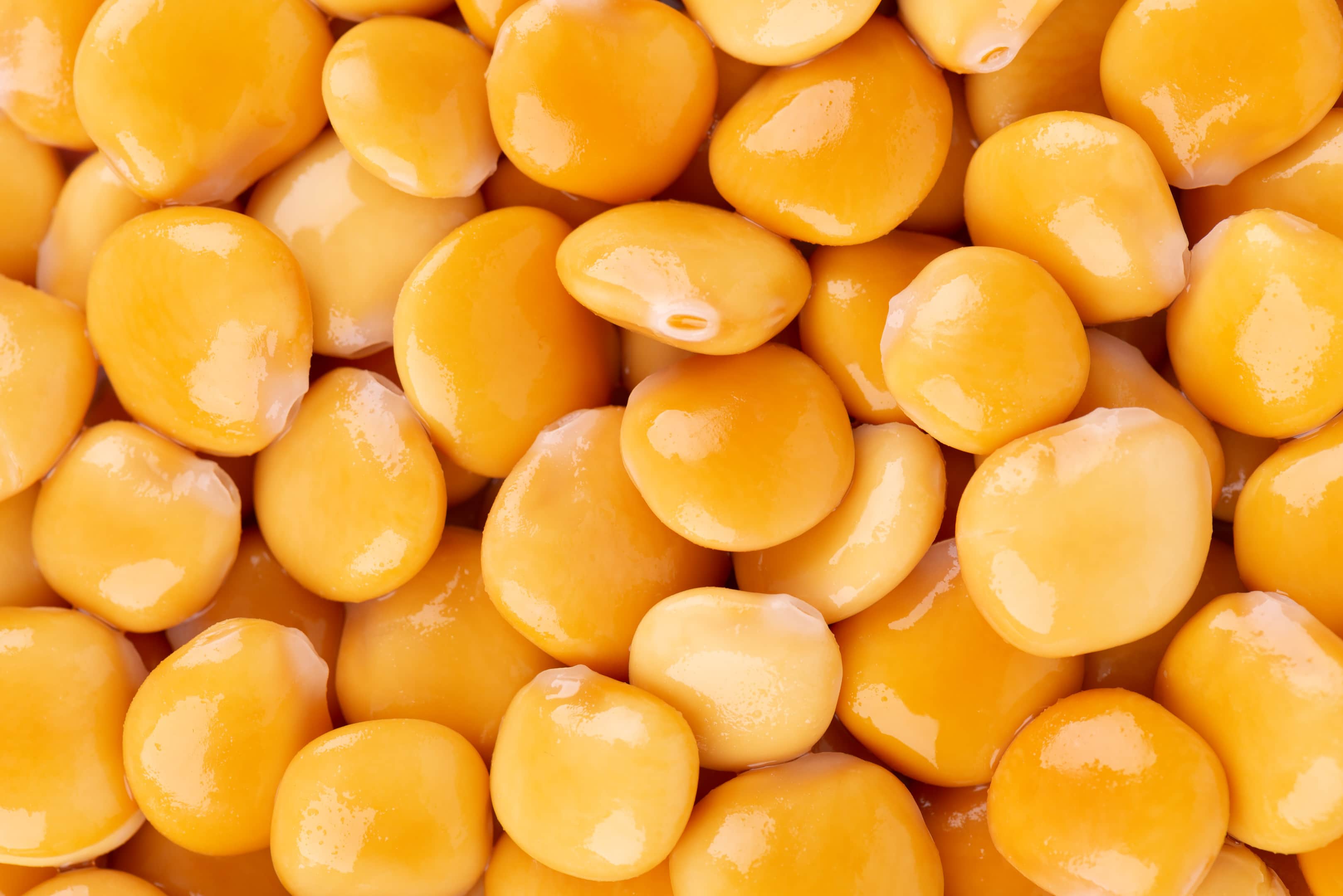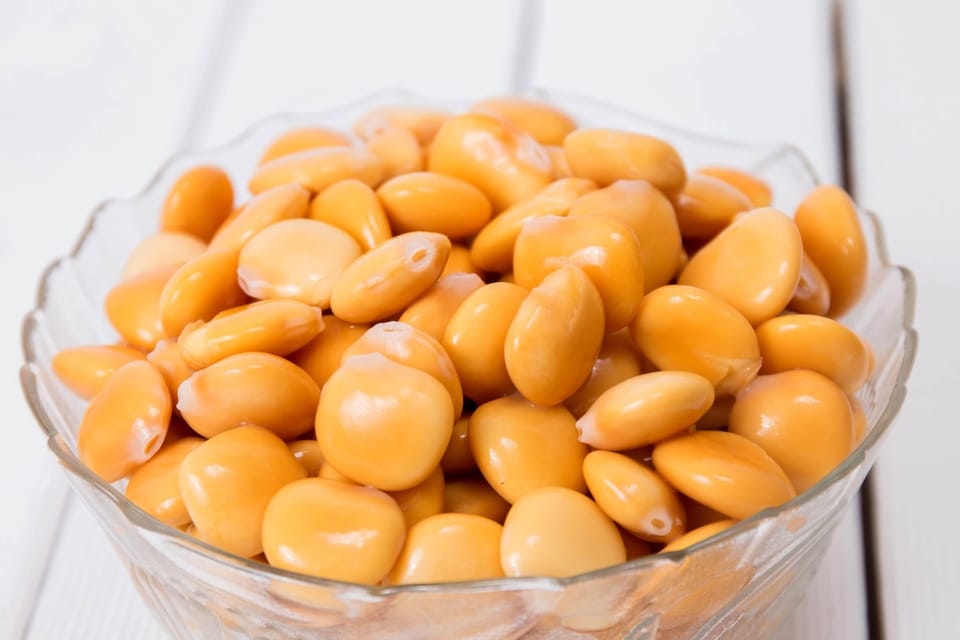Key takeaways
- The post introduces lupini beans (lupin), where they’re eaten, how they’re prepared, and how they compare with other legumes in nutrients.
- For hair, it focuses mainly on lupini bean extracts and describes benefits it attributes to them (like supporting the scalp and hair structure and promoting hair growth), plus notes that they appear in some hair products.
- It also lists broader health benefits it associates with lupini beans (digestive support, blood pressure/heart health, weight loss, gut health, bones, immunity, and anemia-related claims).
- The post includes important cautions: lupini beans can be toxic if not prepared correctly and may trigger allergies in people with peanut allergies.
You have probably heard of chickpeas, red kidney beans, and lentils; but how about lupins? It is a staple in the Mediterranean diet, steadily making a name for itself in the United States. This legume has been making big waves in the land of plant-based proteins!
This bean is a source of an abundant array of health benefits to the body, especially the hair. Read on to know more about these nutritious beans!
Get to know Lupini beans
Lupin or Lupini beans are a type of legume that came from the Lupine plant. It is from the same food family as chickpeas, peas, and lentils. They are famous in the Mediterranean region, specifically in the countries of Portugal, Spain, and Italy.
Lupin can also be found in certain parts of America. These are referred to as yellow legumes and have twice the amount of protein that chickpeas have.
These beans have a naturally bitter taste, resulting from chemicals called alkaloids. Be warned that they are toxic when they are not properly prepared. However, if it is cooked accordingly, it can be both delicious and nutritious. These beans are also common as a snack.
They are also a welcome addition to pasta, salads, or dips. Lupini beans are often pickled in a jar, but you may also find a dried variety of them.
History of lupini beans
The Lupinus plant is native to the Eastern Mediterranean region of Southern Europe (Italy, Greece, Cyprus, and Balkans) and West Asia (Israel, Turkey). Other common names are White Lupin, Termis Seeds, bitter White Lupin, and Broadleaf Lupin.
Lupini beans vs. other legumes
Lupini beans, as compared to other legumes, have fewer calories yet are higher in nutrients like thiamine, Vitamin C, potassium, calcium, magnesium, zinc, iron, and phosphorus. It is considered one of the wealthiest legumes in terms of fiber and protein, with at least twice the amount than other legumes. This makes it an effective ingredient for losing weight and busting hunger.
Furthermore, Lupini beans are a good source of essential amino acids that help lower blood pressure. It also contains novel protein gamma conglutin that aids in regulating insulin levels and blood glucose in the body.
Nutritional facts of Lupini beans
In 100 g (or about 50 beans) of Lupini beans, there are 12 g of proteins, 1 g of fat, 120 calories, 13 g of carbohydrate, and over 3 g of fiber. These beans have at least a third more protein per square inch than other legumes and beans. They also do not contain starch, which means it won't spike up your blood sugar, and at the same time will stave off feelings of hunger.
Lupini beans have a high level of prebiotic fiber, a component that contributes to and aids in developing probiotics that keep the gut healthy. Not only that, these beans are jam-packed with nutrients like bone-strengthening calcium and phosphorus, various minerals, and energy-boosting B vitamins. These legumes also contain magnesium, manganese, iron, and inflammation-fighting antioxidants that can help your body in multiple ways!
Be sure to keep in mind that these legumes have a few notable downsides. As mentioned earlier, they can be toxic when the preparation is not done correctly. Other than that, these beans are typically soaked in salt, which is high in sodium.
Another negative trait is that it holds a bit of resemblance to peanuts. It can cause an allergic reaction for those with peanut allergies.
As long as you keep these downsides into consideration, you will be fine! You can enjoy the great and almost endless list of benefits Lupini Beans can offer.
Benefits of Lupini beans to the hair
Lupini beans have been continuously cultivated over the years, giving birth to several discoveries of their countless health benefits and uses. One of the notable benefits of it is what it can do to the hair! Fear not, as Lupini beans benefits for hair are both proven and tested!
What can it do for the hair?
Lupini beans are jam-packed with proteins and antioxidants that can aid in developing healthy hair. Having a healthy scalp should be one of the primary objectives you need to have if healthy hair is your target and end goal. The beans' high protein content helps make the hair thick, strong, and difficult to fall or break.
The beans also contribute to the formation of a healthier hair structure. Lupini beans extract can also assist in better microcirculation in your scalp. Pento-peptides, which are extracted from the seeds, can stimulate growth. It can help aid in creating a positive and perfect environment for the hair to grow and nurture.
It also contains vitamins, amino acids, and other necessary nutrients that can help generously nourish the hair and promote flourishing hair growth. The beans contain lipids and proteins, both of which offer cosmetic properties.
Another primary concern when it comes to hair is hair loss. It can affect anyone, regardless of their age and gender. The leading causes are usually stress and poor diet. But, look no further, as Lupini beans are also capable of helping with hair loss. White lupin can prevent it. It is rich in protein which dampens the mechanism that is responsible for losing hair.
How to use it?
The extract of Lupini beans is a magical ingredient. You can either prepare the solution yourself or purchase readily available products on the market. There are several hair solutions or products that use Lupini beans extract.
It is best to ask or consult a dermatologist if you are still unsure if you should use it.
Other health benefits of Lupini beans

Lupini beans' health benefits are not just limited to the hair. There are several other benefits, such as:
- Prevents digestive problems — Consuming Lupini beans regularly can aid in keeping the gut healthy, as well as assist in coping with irritable bowel syndrome, constipation, and other digestive-related conditions. With the high fiber content, the stool in your gut is ensured to absorb water from the body.
- Lowers high blood pressure — Hypertension, or having high blood pressure, may be caused by several various reasons. Kidney diseases, an abnormality in the blood vessels' innermost lining, and an excess amount of sodium in the body are among its leading causes.
Lupin protein extracts have proven to correct vascular endothelium dysfunction. It proves to help in relaxing the blood vessels, which plays a hand in lowering high blood pressure. - Protects the heart — The heart is vulnerable to several ailments such as heart attack, heart failure, and atherosclerosis. High blood pressure, high cholesterol levels, or high blood sugar levels are amongst the leading culprits and suspects behind the development of heart diseases.
According to a study, the protein extracts found in Lupin can lower the risk of atherosclerotic lesions. Furthermore, it is proven that it can reduce the culprits mentioned above behind heart diseases. Adequate consumption of Lupini beans can supply the body with the required minerals and vitamins to shield the heart from ailments. - Aids in weight loss — Is losing weight your main concern? Lupini beans can also help you with this. The high fiber content of these beans, in particular, can promote weight loss. It can make a person feel satiated and less hungry for long periods.
- Keeps the intestines healthy — A good digestive system amounts to having good health and high energy. To keep it healthy, you must eat foods that are filled with probiotics and prebiotics. Lupini Beans are a gut-healthy food.
Lupini kernel fiber, in particular, has been shown to aid in the growth of helpful intestinal bacteria (such as bifidobacteria) and reduce the existence of harmful ones like clostridium.
Maintaining a healthy and proper balance of gut or intestinal microbiota means less risk of suffering from disorders like irritable bowel syndrome and diarrhea. - Strengthens the bones — Those who suffer from osteoporosis and fractures have problems with their bones. Two minerals to keep your bones healthy are phosphorus and calcium. Both minerals are found in good quantities in Lupini beans. Consuming them regularly means getting a regular supply of said minerals to keep your bones healthy and sturdy!
- Boosts immunity — Having a healthy immune system means it can fight off several infections. Undertaking a good diet rich in minerals and vitamins can help strengthen and build the immune system. Lupini beans are packed with the essentials for such a job!
- Treats anemia — Anemia is caused by several problems like shortness of breath, fatigue, pallor of the skin, and so on. Lupini beans, in particular, have the capabilities to help in treating anemia to a certain extent, helping to relieve the symptoms. Lupini beans contain a sizable amount of iron that assists in the formation of hemoglobin in the body. Vitamin C in these beans can promote the absorption of iron and help in the formation of hemoglobin.
Conclusion
You may not have heard of Lupini beans before, which is a shame since they are an absolute treasure — both to taste buds and the body. One aspect of ourselves that can benefit the most from them is our hair!
Lupini beans benefits for hair are trusted by most, with several eligible cosmetic brands incorporating the extract to their products. Aside from hair, other parts of the body can also benefit from these beans, such as the skin and the heart. Lupini beans have such a long list of nutrients that promotes several health benefits.






